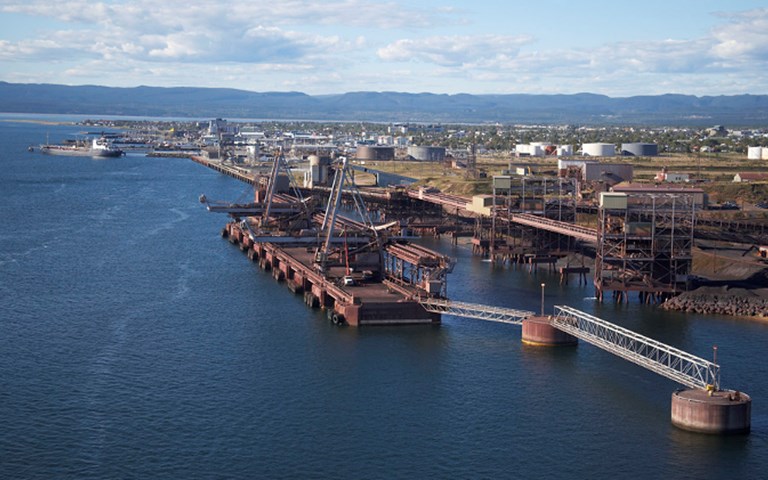The two Quebec Innu communities' lawsuit against Rio Tinto subsidiary IOC alleges that its existing mines, rail and port facilities, including its operations in Sept-Îles, QC (pictured), fall within their traditional territory. Courtesy of Rio Tinto
Canada’s Supreme Court will hear an appeal to two Quebec Innu communities’ years-long attempt to sue Rio Tinto’s Iron Ore Company of Canada (IOC) for alleged violation of its aboriginal title.
The province of Newfoundland and Labrador is appealing a 2017 Quebec Court of Appeal decision that upheld a Quebec Superior Court ruling allowing the Innu of Uashat mak Mani-utenam and Matimekush-Lac John’s lawsuit against the IOC to proceed in Quebec, despite the allegations pertaining to territory that spans both Quebec and Labrador.
The province will argue to the Supreme Court that Quebec has no authority to decide a case that involves jurisdiction outside of its province, and that the case should be split in half.
The two communities, which are seeking $900 million in damages for grievances that include displacement and environmental damage, allege that IOC’s operations – including mines in Schefferville, Quebec, and Labrador City; a railway that cuts through northeastern Quebec and Labrador; and a deep-water port on the St. Lawrence River – fall within their traditional territory.
Related: Supreme Court rules out mining development in majority of Yukon watershed
In October 2016, the Quebec Superior Court dismissed a motion from Rio Tinto that asked the court to remove portions of the lawsuit that related to operations outside of Quebec. Justice Thomas M. Davis, citing the Supreme Court’s 2014 Tsilhqot’in decision that accorded the First Nation title to a large swath of land in central British Columbia, wrote in his decision that “Aboriginal rights were exercised and are exercised to date without regard to provincial boundaries.”
Newfoundland and Labrador, which had intervened in the case, appealed to the Quebec Court of Appeals, which then rejected it.
This is the second time the case against Rio Tinto has made its way to Canada’s highest court. In October 2015, the Supreme Court rejected the company’s attempts to have the lawsuit, and a separate one by multiple B.C. First Nations, dismissed. Though the Supreme Court did not rule on the challenges, it upheld the appellate court rulings from B.C. and Quebec. The cases were heard on the same day due to their similar nature.
Rio Tinto had argued at the time that First Nations groups must sue the government to prove their aboriginal title rights before they could sue the company. The Supreme Court ruling set significant legal precedent by allowing Indigenous groups to sue companies directly for alleged title violations.



